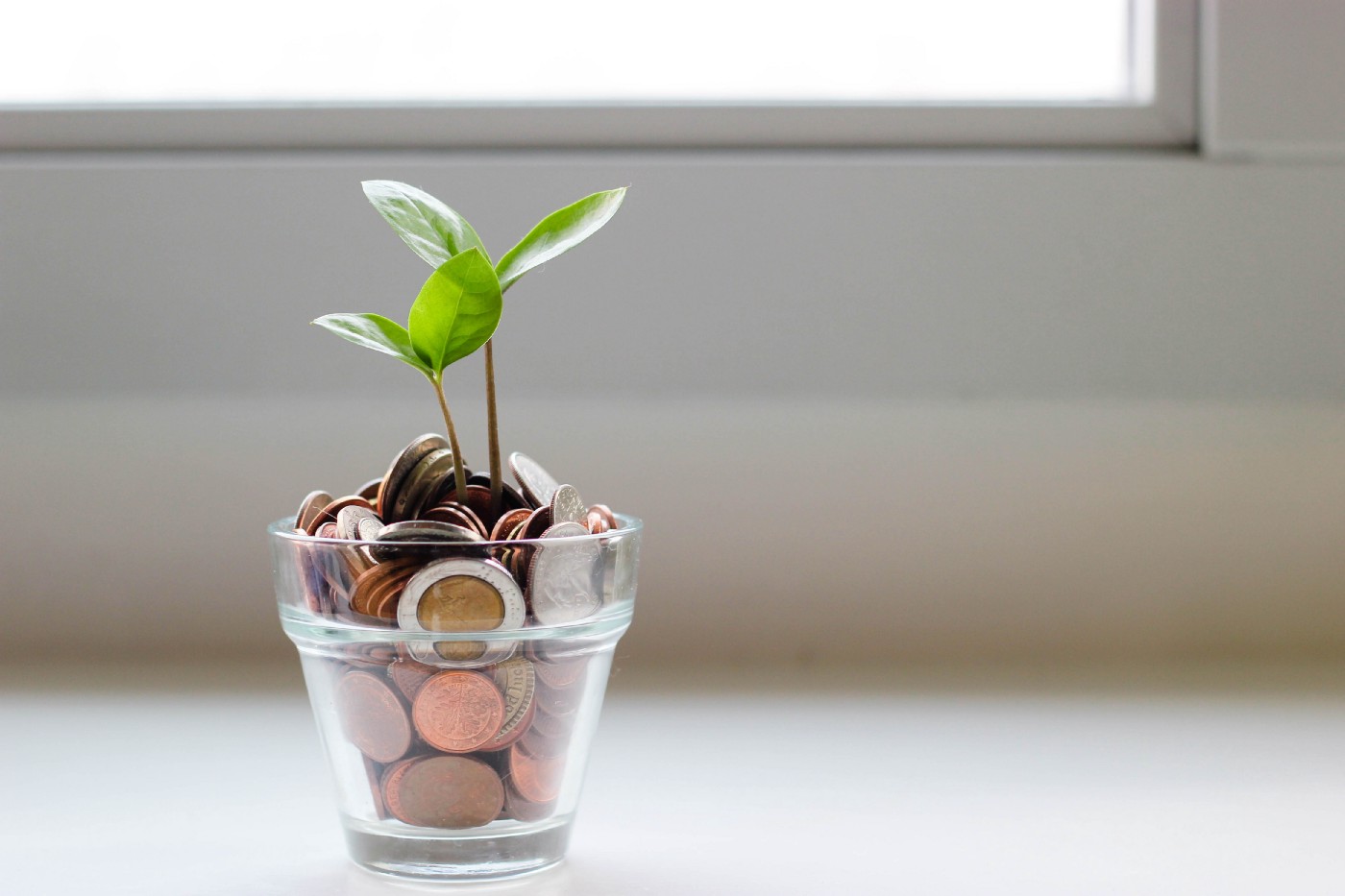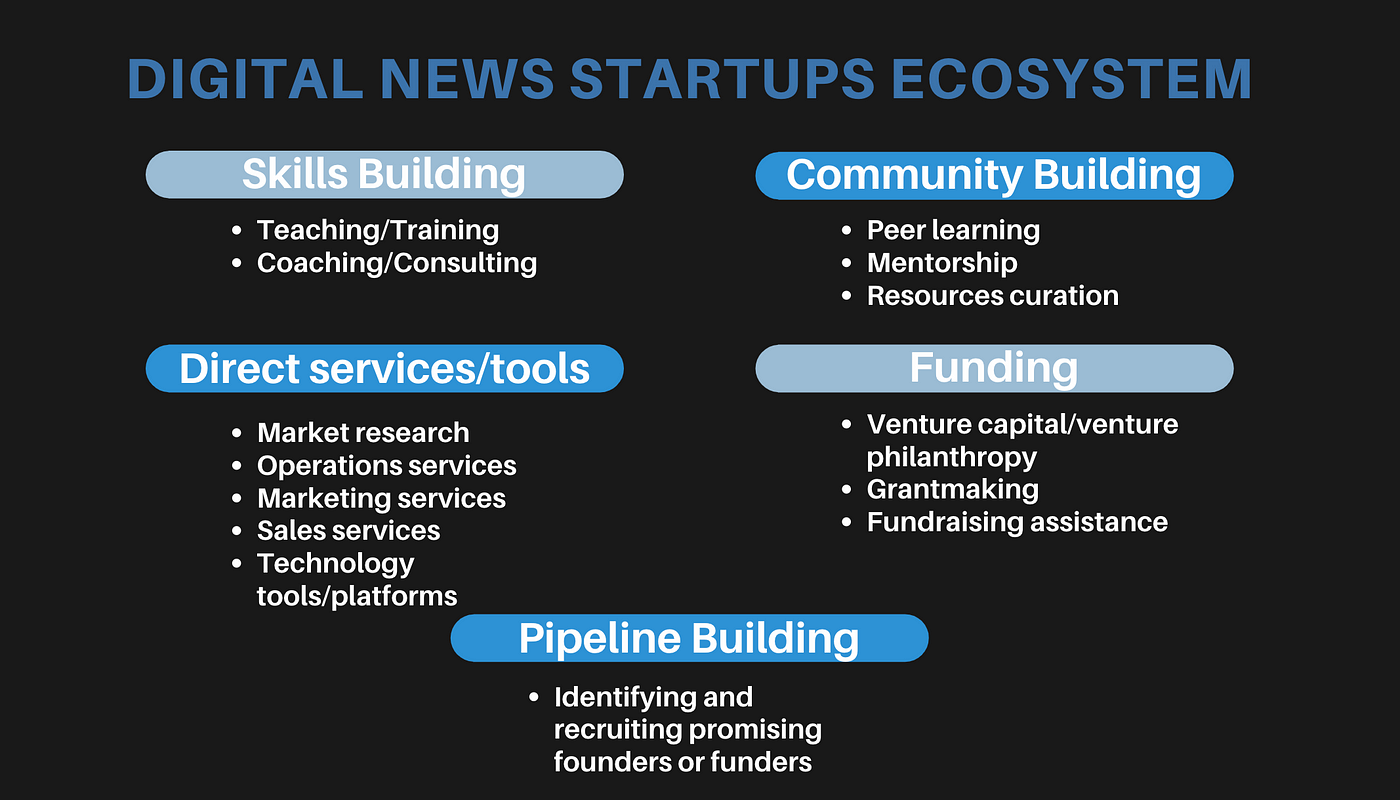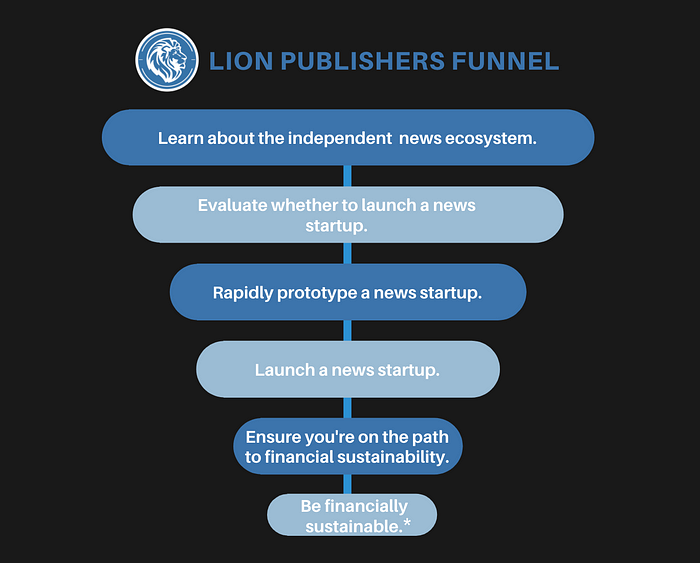How we’re transforming LION Publishers into the destination for news entrepreneurs
If we want to help preserve the impact of good journalism, we must support journalism entrepreneurship that leads to financially

If we want to help preserve the impact of good journalism, we must support journalism entrepreneurship that leads to financially sustainable news organizations. And this is most important for communities that have been historically underrepresented or mischaracterized by existing legacy news publications.
Fortunately, an ecosystem is beginning to emerge among those of us who are trying to create and support digital news startups. While each of us may have different theories of change, I’m confident we’re all after the same goal: To ensure that the future of independent media is equitable, impactful and sustainable.
In my role as programming director at LION, I’ve spent the last year taking educated guesses at where LION should live within this ecosystem. Now I’m sharing what I’ve learned: a quick back-of-the-napkin assessment of the current support landscape for aspiring news entrepreneurs, and a funnel for how to get more folks interested and able to build financially sustainable and impactful journalism.
I hope by thinking out loud that you, person who is reading this, can help inform LION’s next steps by challenging or helping me better articulate some of the hypotheses I’ve laid out here.
I believe the digital news startups ecosystem is roughly divided into five categories: helping entrepreneurs gain the skills they need to succeed; creating a peer-support network that encourages entrepreneurs to learn from and adapt each others’ ideas; providing direct services specifically tailored to digital startups’ needs and capacity; providing direct funding or fundraising assistance; and helping build the pipeline for future founders, independent news employees and funders.

While there are many other organizations and projects that provide products or services that aspiring entrepreneurs can use, the efforts I discuss below are the only ones I know of that are squarely focused on helping train aspiring entrepreneurs and launch digital news startups.
Efforts like AAJA Catalyst, INN Springboard, and the Newmark J-School’s new program fall into Skills Building. Indiegraf helps aspiring Canadian entrepreneurs with Skills Building, through its Indie News Challenge, as well as some Direct Services, like marketing and technology. (Disclosure: I’m an advisor for Indiegraf). The American Journalism Project’s venture philanthropy experiment falls into Funding. I’m not sure if anyone is working on Pipeline Building yet (please e-mail me if you are!) And then there’s Community Building, where LION has historically focused its efforts, which includes connecting our members to each other and other useful resources.
It’s been a year since I joined LION, an association largely created to cure the loneliness that many first-time news entrepreneurs faced in communities across the U.S. And for the last eight years, our members have told us that it delivers on that value proposition of peer support.
“As independent reporters who wanted to provide better local news in our community, we never would have been able to build our organization to sustainability without the invaluable expertise and supportive community offered by LION,” said Kate Maxwell of Mendocino Voice. “We would not have made it this far without the opportunities, guidance and camaraderie, provided by LION members.”
Another member, Avant-Youth’s Judith Kim, said, “It’s a space where I may feel less alone about the struggles of running a local news organization — that human element alone, especially during these trying times, gives me the courage to keep going.”
That peer support is a crucial foundation for LION to build on as we move into our next stage of growth, which falls into the Skills Building category. Over the last few months, we’ve designed and piloted programming to help entrepreneurs at the intersection of product, revenue and operations–– three skill sets that many traditional journalists don’t have but are absolutely essential to running a successful news business. We’ve also contributed to research about digital startups, revised our membership criteria and started the GNI Startups Lab, our training program for aspiring entrepreneurs.
Our list of ideas is endless, but our resources are not. So as our organization gets closer to defining its strategic vision, I created this funnel as a way for us to begin mapping the stages of the news entrepreneur’s journey, and thinking about how LION is best poised to support people and organizations at each of those stages.
This funnel also represents my current hypothesis on how we help create more digital news startups that are financially sustainable and that create meaningful impact in how we learn and share information.

Learn about the independent news ecosystem.
First, we have to help more people understand what it means to be an independent news organization. What are the benefits? The risks? Why do we, LION, think independent news is the future of media? Many people who are already news founders are the early adopters. They didn’t need much convincing because it just made sense to strike out on their own. But there are others with lower risk tolerance or who don’t have networks or models of success to look to–– those are the folks I want to reach in this part of the funnel. Here are some ways we plan to do that:
- LION newsletter: Our weekly newsletter highlights what’s happening in the independent news ecosystem and opportunities for news entrepreneurs to take advantage of. It’s also an easy way to get introduced to what’s happening in the independent news world. Sign up here.
- LION Summit and awards program: It’s super fun to win an award, but it’s also an excellent way for us to make the case that independent news organizations are doing great work. Our submissions for the 2020 LION Local Journalism Awards are open–– apply by August 16 and attend our awards ceremony, sponsored by the Donald W. Reynolds Journalism Institute, on Oct. 22.
- Project Oasis independent news database: As part of our Project Oasis effort, we’re helping launch a database of more than 250 online publishers that will include information about their products, revenue mix and audience reach and impact. We hope this is a useful entry point for anyone who wants to learn more about existing independent news organizations.
- Entrepreneurial Journalism community: As part of our Google News Initiative Startups Lab (more on that below) we’re creating a free-to-join community of practice for anyone interested in entrepreneurship and startups in journalism. Sign up to be invited when we launch it. (P.S. We’re hiring someone to help us build this community!)
Evaluate whether to launch a news startup.
Once someone sees the potential benefits of independent news ownership, they may consider starting their own business. This is where we lose a lot of would-be great entrepreneurs, because where to go from here can be a black box for those without existing knowledge or connections. We need to demystify the process of launching a news startup at this point of the funnel so that folks have clear and realistic expectations of what could come next.
- Journalism entrepreneurship 101: Also as part of Project Oasis, we’ll be supporting our partners at UNC-Chapel Hill in designing a class for students interested in news entrepreneurship, and we hope to make this class available to more folks in the future. We’ll share more on this soon!
Rapidly prototype a news startup.
If you’re serious about wanting to make a living from starting a news business, you need to be prepared to clearly define the customer need and your proposed solution, and, as soon as possible, create the most basic version of your idea to put in front of a potential audience for feedback. This is called “de-risking” your idea, which means before you pour lots of time and money into it, you’re ensuring it’s something people actually want (and are potentially willing to financially support!). Sometimes aspiring entrepreneurs, across industries, skip this step, go straight into launching a business, and end up losing a lot of time and money on an idea that went nowhere. That’s why we believe so strongly in supporting this part of the funnel.
- Google News Initiative Startups Lab: We’ve partnered with the Google News Initiative to launch an effort that will help aspiring news entrepreneurs in the U.S. and Canada prove there is a need and audience for their idea, build their news product and set their business on the path to sustainability. The first phase of this Lab is an eight-week boot camp to help aspiring news entrepreneurs develop their idea into a minimum viable product they can put in front of potential customers. Learn more here and apply by August 17. (P.S. We’re hiring someone to help us run this program!)
Launch a news startup.
Once you’ve identified an audience that is excited and ready to support your work, you can raise and invest more resources to put toward launching the business. (Launching a news business could use its own funnel because there are so many moving parts, so think of this as a really broad part of our basic funnel for now.)
- Project Oasis Pathways Playbook and Starter Pack: Soon we’ll be sharing an interactive playbook for aspiring news entrepreneurs (and we imagine existing news entrepreneurs will find it useful too). The Pathways Playbook and Starter Pack will include insights from news founders, documenting the crucial choices they made through the lifecycle of their products; useful checklists, templates, resources and other artifacts to launch a business; specific key performance indicators/success benchmarks that entrepreneurs need to move their business from pre-launch to launch to stability.
- Google News Initiative Startups Lab: We’re developing a second phase of the Lab that will be more focused on news entrepreneurs who have already launched a prototype or news business and want help getting that business on the path to financial sustainability. We’ll be sharing more details about this soon.
- LION aspiring entrepreneurs mentorship program: We recently announced a new membership tier for aspiring news entrepreneurs at half the price of our full membership with all the same benefits, plus one: being paired with an existing LION member. We know how powerful mentors can be, especially for those who are completely new to running a business, and we want to help facilitate those relationships. We’re aiming to launch this program by the end of the year.
Ensure you’re on the path to financial sustainability.
After launching, it’s tempting to think the hardest stuff is behind you, but many of our members will tell you that the most challenging work is just beginning. Many of our current members tell us they are missing some foundational knowledge of how to build and grow their business. That’s why we’ve been so focused on Skills Building programs at this part of the funnel. (It’s our hope that future aspiring entrepreneurs have access to these kinds of resources much earlier in their journey.)
- LION Slack groups: It’s important for our members to have a space to share ideas, ask questions and learn from one another. We created a Slack group earlier this year so we can better organize those conversations. LION members can request to join here.
- LION Expert Network: We are currently piloting the Expert Network, which connects LION members with local news consultants. A group of LION members were given a limited number of hours they could “spend” on any consultant from this database. So far our members have told us this has been hugely helpful to them. Looking beyond the pilot, we are hoping to extend this as a LION member benefit to help members get outside expertise and perspective on their work, and to help raise the profiles of consultants working in local news. Learn more here.
- LION Lessons: LION Lessons are monthly members-only Zoom calls featuring a LION member who shares strategies for solving a problem or challenge that other LION members are also facing. So far we’ve heard from Berkeleyside’s Lance Knobel on membership; WhereBy.Us’s Alexandra Smith on growth; VTDigger’s Stacey Peters on a member service portal; Chalkbeat’s Maria Archangelo on fundraising; Detour Detroit’s Ashley Woods Branch on grant writing; The Plug’s Sherrell Dorsey on inclusive storytelling; and The Devil Strip’s Chris Horne on mission-aligned revenue strategies.
- LION Entrepreneurial Skills Series: There’s a wealth of trainings for news organizations and journalists, but very few are dedicated to the solopreneur or less-than-five-employees business. Sowe’re piloting three month-long Series that will each focus on a specific skill set needed to run a financially sustainable local news business.Our August series, “Managing Money for News Entrepreneurs,” is underway and being taught by Harry Backlund of City Bureau. Our September series, “Designing products with your audiences,” is being taught by Rebekah Monson of WhereBy.Us. (LION members: Apply to join that series now). And we’ll announce soon the facilitator for our October series, “How to build and run inclusive and equitable news businesses,” sponsored by John S. Knight Journalism Fellowships. After this three-month pilot, we want to design more Skills Series on different topics. Learn more here.
Be financially sustainable.*
*When I say be financially sustainable, this includes making impactful news and information.
A decade ago it was impressive for a news startup to simply exist. But as the independent news industry evolves, so must our metrics of success. That’s why this is the last step in our funnel: We believe for a news startup to be successful, it must be financially sustainable and have a journalistic impact.
This is obviously challenging, but actually the bigger challenge is agreeing on what we mean by sustainability and impact, and then holding ourselves to those standards. The simplest definition of sustainability is that a business’s profits exceed its costs, but there are other metrics to consider as well: Are your employees happy? Do you have a founder succession plan to ensure your work lives on? Do you have the ability to grow or make new investments if you choose to? Measuring qualitative journalistic impact can also be tricky, and while many attempts have been made to try and create a standard impact measurement, I think it’s more important for us to standardize a framework that any newsroom can adapt for the communities they’re serving.
We still have more work to do at this part of the funnel. We have a few ideas about how to approach this work, including working directly with a group of our members to look at their data together and figure out what metrics are most meaningful to track across digital news startups. Once we can work backwards from our success state, it will only strengthen each part of the funnel offerings for existing and future entrepreneurs.
Whew, ok. Still with me? I appreciate it, because this work is urgent. We’re consistently seeing more journalists, who are tired of legacy media’s baggage, determined to design from scratch more equitable and community-centered newsrooms, particularly for communities that have often been overlooked or mischaracterized by traditional media. Digital news startups show incredible promise, but we still have a long way to go to ensure they can replace the crumbling bedrock of our fractured and flailing media industry.
And if I’ve learned anything from watching the entire industry coalesce around trying to save legacy news publications, it’s that coordination and collaboration across all of these journalism support organizations is absolutely crucial. If we want to eradicate news deserts; ensure stories from historically underrepresented communities are being accurately reflected; and help founders who don’t have the financial ability to launch a business without significant resources, we must be more intentional about the support system we are building for journalism entrepreneurs.
My hope is if you’re someone operating in or interested in operating in this space, you’ll reach out with thoughtful feedback, critiques or ideas on how we can partner or support each other’s work.
Anika Anand is the programming director of LION Publishers, a journalism association supporting independent online news publishers. Our mission is to help existing and aspiring local news entrepreneurs build and grow financially sustainable small businesses. You can reach her at [email protected], or follow her on Twitter where she sometimes tweets things.
A big thanks to so many people I’ve spoken with over the past year who have helped inform my thinking around this work, and a very special thank you to Yvonne Leow and Ariel Zirulnick for helping
Sign up for the weekly newsletter
Join the LION mailing list to get our weekly roundup of opportunities and resources for news entrepreneurs. View our most recent issues.
Related Articles
How five LION members are maximizing revenue and community engagement through events
Whether you’re a solopreneur or part of a larger team, there are in-person event opportunities for everyone.
Jess deRivera joins LION Publishers as our Membership Services Manager
She’ll help provide a seamless experience to current and prospective members.
Four big opportunities that local news publishers can pursue right now
Here’s how to capitalize on each one.
